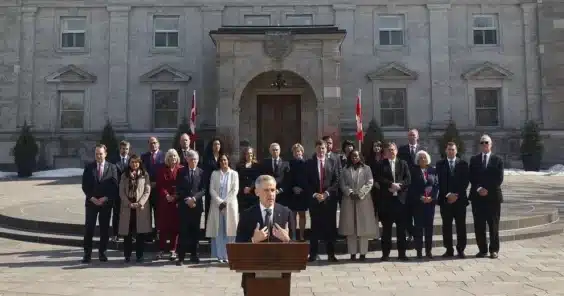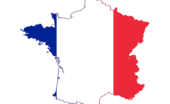Molly Minturn - My family is heartbroken to share that my father died in surgery on Monday, Feb. 10. It…
Canada Federal (Carney) Liberals 14 March —
Written by Diana Thebaud Nicholson // March 31, 2025 // Canada, Government & Governance // No comments
Liberal Leader Mark Carney has called an April 28th federal election in Canada — and in the face of Donald Trump’s continuing threats to make Canada a 51st American state, the world is watching.
31 March
Carney Vows to Revive Canada’s Wartime-Era Homebuilding Strategy
(Bloomberg) Liberal Leader Mark Carney promises to create a new entity called “Build Canada Homes” to build affordable housing, including on public lands, and provide financing to prefabricated-home builders.
The plan aims to catalyze private capital, cut red tape, and reintroduce a tax incentive to spur rental home construction, as well as facilitate the conversion of existing structures into affordable housing.
Carney’s government would maintain and build upon the housing accelerator fund, and cancel the federal sales tax on homes under C$1 million for first-time homebuyers.
28 March
Mark Carney promises plan to ‘reform’ the CBC in coming days
(National Post) Liberal Leader Mark Carney has promised to introduce a reform plan for CBC/Radio-Canada to ensure its viability and vibrancy, though he did not provide specific details. He emphasized that his approach would differ from Conservative Leader Pierre Poilievre’s plan to defund the CBC while maintaining Radio-Canada, calling Poilievre’s idea unrealistic. Carney believes that Radio-Canada can only survive as part of a viable CBC. His reform plan, initially expected to be announced in Quebec City, was postponed in light of U.S. President Donald Trump’s tariff announcement. Carney’s comments follow Poilievre’s promise to protect French-language services at Radio-Canada while defunding the CBC, and the potential inspiration for Carney’s reforms may stem from a proposal by former Heritage Minister Pascale St-Onge to overhaul CBC’s funding and governance.
25 March
Mark Carney promises new submarines, more icebreakers, pay-raises for Armed Forces
(Globe & Mail) Liberal Leader Mark Carney pledged to buy new submarines, fleets of drones and more heavy-duty icebreakers while hiking pay for Canadian Armed Forces personnel as part of a commitment to raise defence spending.
“We will deliver an unprecedented acceleration of investment in our armed Forces so that we can defend every inch of our sovereign territory, while also helping to support and defend our allies abroad,” Mr. Carney said during a campaign stop in Halifax at Irving shipyard Tuesday.
Carney welcomes former minister Sean Fraser’s return to federal politics
Former housing minister Sean Fraser confirmed Tuesday that he will be running for re-election in his Nova Scotia riding after all.
His decision comes about three months after he told Canadians he wouldn’t be running again to spend more time with his family. … Fraser said Carney had promised to help find a better balance to be an MP and a father. “Honestly, it’s high time that we make these jobs sincerely family-friendly and I trust him to do it,” Fraser said.
Carney said he “regretted but respected” Fraser’s decision in December to leave federal politics for family reasons but that he now joins other “exceptional people stepping up for the Liberal party at the country’s time of need.”
Fraser is at least the fifth Liberal MP who planned to step aside as the party’s poll numbers continued to plummet, but who have now changed their mind.
Mark Carney, progressiste-conservateur
Le nouveau chef libéral ressemble plus à un progressiste-conservateur qu’à un libéral. Et ça fait mal tant aux conservateurs qu’aux progressistes du NPD, explique notre collaborateur
23 March
Carney acknowledges protesting N.L. fish harvesters during 1st campaign stop
Heavy police presence as protesters continue to block lobby of St. John’s Convention Centre
Liberal Leader Mark Carney kicked off his election campaign in St. John’s on Sunday, promising tax cuts and also addressing the hundreds of protesting fish harvesters outside the city’s convention centre.
During his speech, Carney acknowledged the protesting harvesters, and said he is there to listen. He said his government will take a closer look at the department of Fisheries and Oceans, with the goal of creating a sustainable fishery and potentially restructuring the department.
“I understand the importance of making decisions closer to the wharf,” said Carney. “We’re all here for sustainable fishery and sustainable livelihoods, and we’re going to make sure that happens.”
Can Mark Carney truly connect with Canadian voters? Canada will now find out
Kevin Quigley, Scholarly Director of the MacEachen Institute for Public Policy and Governance at Dalhousie University
… With such a high level of economic uncertainty today in the face of repeated threats from United States President Donald Trump, his supporters say he’s the right person to lead Canada. His chief rival, Conservative Leader Pierre Poilievre, was first elected to the House of Commons at the age of 25 and has quite a different CV.
… Carney, however, might struggle more with the other characteristics of trustworthiness — seeming open and showing concern
… On the surface, this is about transparency, but in fact it’s just as much about empathy and whether Carney can relate to working-class voters. By alluding to Carney’s wealth and connections, the Conservatives are implying that Carney is an out-of-touch elite who doesn’t share the concerns of average Canadians.
… The fact that Carney dropped the carbon tax and capital gains tax was an early sign that he’s not an economist anymore, he’s a politician.
The challenge for Carney — and for any politician in the heat of an election campaign battle — will be to find the sweet spot that reconciles expert opinion with public concerns and to articulate policies in a manner that voters will understand and support.
… The King met with Trudeau at Sandringham, the royal family’s private estate in Norfolk, England, on March 3. This meeting seems to have prompted a series of symbolic gestures demonstrating the monarchy’s solidarity with Canadians.
Trump threats: Is foreign policy the biggest issue for Canadian voters this election?
Adam Chapnick of the Royal Military College of Canada explores whether Trump and Canadian foreign policy will dominate the campaign
Foreign policy is what people who study elections call an “issue,” just like the economy, national security or health care.
This election will offer voters competing visions of Canada’s future at a time when it has become all but impossible to separate foreign policy from domestic politics.
There’s no question much of the conversation during the campaign will centre on how the next government will deal with United States President Donald Trump amid his continuing threats to Canadian sovereignty.
But even though the Trump administration has undermined the liberal democratic world order in which Canada has prospered for close to a century, it’s unclear whether threats of a global tariff war, an ongoing divisive conflict in the Middle East and continued Russian aggression in Ukraine will directly affect how Canadians cast their votes.
My new report, “Foreign Policy and Canadian Elections: A Review,” finds truth on both sides.
Andrew Heffernan of the University of Ottawa looks into the climate policies of the federal parties and whether their climate action initiatives will play a role in how voters cast their ballots.
How political leaders communicate climate policy should be a defining factor this election
The current iteration of Canada’s consumer carbon rebate is dead — which many view as a casualty of effective communication — yet climate policy remains a pressing topic for voters and a major battleground for political leaders.
For Carney and the Liberal Party, the challenge is twofold. First, the Liberals must present a new climate plan after the collapse of the consumer carbon rebate, which has faced widespread public opposition in recent years.
While the new Liberal leader has already terminated the the carbon rebate, it still remains unclear what exactly his comprehensive climate plan will look like.
Climate change is no longer just an environmental issue; it’s increasingly seen as a matter of economic survival, with green energy jobs and clean technologies representing an opportunity for Canada to position itself as a global leader in the sector.
Carney will have to make a convincing case that his policy will create jobs, stimulate innovation and provide a clear path toward a greener, more sustainable economy.
21 March
Carney aims to have ‘free trade by Canada Day’ between provinces and territories
Canada to develop national trade strategy, PM says.
Carney says he’ll keep carbon emissions cap.
Ottawa to set up ‘one project, one review’ system to speed approval of major projects.
Government will temporarily remove one-week waiting period for employment insurance.
Prime Minister Mark Carney says he and Canada’s premiers have agreed to develop a national trade strategy and promised a slew of support for workers and businesses.
“We intend from a federal level to have free trade by Canada Day,” he said, noting that the plan would be directed at easing transportation, energy, critical minerals and digital connectivity restrictions across the country.
20 March
Evan Solomon to run for Liberals
Evan Solomon announced on Thursday that he will be returning to Canada and running for Mark Carney’s Liberals. A former Canadian broadcaster, he has been GZERO’s publisher since 2022.
“Given the urgent challenges and threats facing Canadians right now, I’ve decided it’s the right time to come home and do whatever I can to help serve my community and country,” Solomon said in a LinkedIn post. “I will be joining the team led by Prime Minister Mark Carney and will be running as a candidate in the next Federal election.
Former minister Carlos Leitão to run for the Liberal Party of Canada … According to the same source, Leitão is due to run in the Laval riding of Marc-Aurèle-Fortin. This riding is currently represented by Liberal Yves Robillard.
Scott Gilmore shares a quick update. Last month, I stepped away from Anchor Chain and joined Mark Carney’s transition team. Now that he is sworn in as Canada’s 24th Prime Minister I have agreed to remain in his office, at least during the initial period, as the PM’s Senior Advisor on Foreign, Defence, and Security Policy.
18 March
Carney announces plans to boost Canada’s military footprint in the Arctic
(CTV) Prime Minister Mark Carney said Tuesday that Ottawa will expand the Canadian Armed Forces’ presence in the Arctic and turn to Australia’s over-the-horizon radar tech to monitor threats from adversaries such as China and Russia.
Carney also pledged $253 million in new funding for Indigenous reconciliation initiatives in the North.
They include $94 million to upgrade power plants in Nunavut and $20 million for a hydroelectricity project to help move northerners off diesel.
Carney spoke with Australia’s Prime Minister Anthony Albanese Tuesday morning about a new partnership on a long-range over-the-horizon radar system.
Carney ‘gets it,’ Obed says after meeting with new PM
Inuit leaders optimistic about future of Indigenous-Crown relationship after prime minister visits Iqaluit
17 March
Carney visits Macron and Starmer as he seeks alliances amid Trump trade war
Canadian PM stresses importance of ‘reliable allies’ in Paris before travelling to London where he was received by king
Without mentioning the US president by name, Carney and the French president, Emmanuel Macron, made a joint appearance in Paris to show a united stance against what they said were economic and geopolitical crises – a reference to Trump’s trade war and “America first” diplomacy that has left longtime allies scrambling.
Carney, who turned 60 on Sunday, travelled later on Monday to London where he was received at Buckingham Palace by King Charles, Canada’s head of state. After a 30-minute private conversation with the king, he was greeted warmly by Keir Starmer on the doorstep of No 10.
The UK prime minister said: “The relationship between our two countries has always been strong. Two sovereign allies, so much in common – a shared history, shared values, shared king.”
How Mark Carney’s choice of finance minister shows he wants to shake things up
…perhaps the most telling of Mr. Carney’s attempts to speed up the way things work in Ottawa – and potentially the most consequential, if he gets a chance to actually govern after the election he is about to call – is his choice of Finance Minister.
François-Philippe Champagne is not necessarily the person to put in that job for deep soul-searching about the future of the Canadian economy, amid a trade war with the United States and a crumbling … There will only be so much elbow room for any finance minister, serving under someone who was one of the world’s best-known bank governors. What Mr. Champagne instead brings to the table is an unusually energetic and transactional management style that, unlike many of the colleagues who served alongside him in Mr. Trudeau’s cabinet.
15 March
Carney expected to meet King Charles during his first trip abroad as prime minister
PM will also meet with the French president in Paris, Nunavut premier in Iqaluit
The PMO said the trip is meant “to strengthen two of our closest and longest-standing economic and security partnerships, and to reaffirm Canada’s Arctic security and sovereignty.”
14 March
Carney kills consumer carbon tax in first move as prime minister
Canadians will still receive a final rebate in April, Carney says
Carney’s first day: Prime Minister focuses on workers and economy in first speech, promises updates on carbon pricing
Key moments:
His new cabinet will prioritize protecting workers from U.S. tariffs and investing more in housing and the economy, Carney said in his first speech as PM
No date yet set for the federal election, and news on carbon pricing will come today
Cabinet Swearing-in: PM Carney Holds News Conference – March 14, 2025
Prime Minister Mark Carney speaks with reporters at Rideau Hall after he and his cabinet are sworn in in a ceremony at Rideau Hall in Ottawa. (CPAC video)
Mark Carney is officially Canada’s new prime minister

Mark Carney has been sworn in as Canada’s 24th prime minister, while unveiling the smallest federal cabinet and ministry in years.
(Global news) Gov. Gen. Mary Simon presided over the ceremony, which also saw Carney reveal 23 cabinet ministers – a much smaller group than Trudeau’s cabinet, which had 39 members, including him.
Carney’s cabinet comprises of 13 men and 11 women.
Some current ministers primarily dealing with the United States will keep their roles. These include Public Safety Minister David McGuinty and Foreign Affairs Minister Melanie Joly.
The new cabinet has 23 ministers, plus the PM, and includes most of Justin Trudeau’s former senior cabinet members
Dominic LeBlanc will remain as minister of intergovernmental affairs and also becomes minister of international trade, while his finance portfolio goes to Francois-Philippe Champagne, who is the new finance minister.
Anita Anand – minister of innovation, science and industry
Gary Anandasangaree – minister of Crown-Indigenous and northern affairs, minister of justice and attorney general of Canada
Rachel Bendayan – minister of immigration, refugees and citizenship
Bill Blair – minister of national defence
Kody Blois – minister of agriculture and agri-food and rural economic development
Élisabeth Brière – minister of veteran affairs and minister responsible for the Canada Revenue Agency
Francois-Philippe Champagne – minister of finance
Terry Duguid – minister of environment and climate change
Ali Ehsassi – minister of government transformation, public services and procurement
Nathaniel Erskine-Smith – minister of housing, infrastructure and communities
Chrystia Freeland – minister of transport and internal trade
Steven Guilbeault – minister of Canadian culture and identity, Parks Canada and Quebec lieutenant
Patty Hajdu – minister of Indigenous services
Arielle Kayabaga – government House leader and minister of democratic institutions
Kamal Khera – minister of health
Dominic LeBlanc – minister of international trade and intergovernmental affairs and president of the King’s Privy Council of Canada
Steven MacKinnon – minister of jobs and families
David McGuinty – minister of public safety and emergency preparedness
Ginette Petitpas-Taylor – president of the Treasury Board
Joanne Thompson – minister of fisheries, oceans and the Canadian Coast Guard
Rechie Valdez – chief government whip
Jonathan Wilkinson – minister of energy and natural resources
Several high-profile names are out of the cabinet, such as Mark Holland, who was previously the health minister and announced on Thursday he will not run again for election, Jean-Yves Duclos, who served as the public services and procurement minister under Trudeau’s government.
In addition to his cabinet, Mr. Carney is putting in place the staff who will surround him in the Prime Minister’s Office. His chief of staff is former Liberal MP and cabinet minister Marco Mendicino; assisting him is Cyndi Jenkins, who has served as a chief of staff to several Liberal cabinet ministers. Marjorie Michel, Mr. Trudeau’s former deputy chief of staff who left to join the party’s election campaign team, will return to the PMO for a short period to assist and will then run for election as an MP in Mr. Trudeau’s riding of Papineau.
Other key players are Jane Deeks as the director of communications, Kevin Lemkay as director of parliamentary affairs and issues, Angad Dhillon as director of operations and Tim Krupa handling policy.



